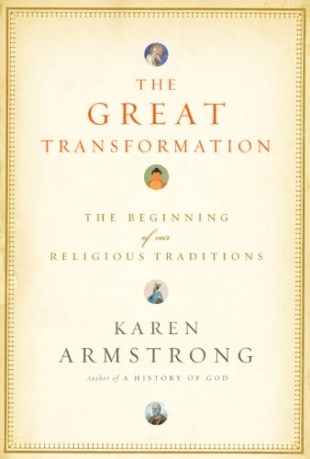"What mattered was not what you believed but how you behaved. Religion was about doing things that changed you at a profound level. Before the Axial Age, ritual and animal sacrifice had been central to the religious quest. You experienced the divine in sacred dramas that, like a great theatrical experience today, introduced you to another level of existence. The Axial sages changed this; they still valued ritual, but gave it a new ethical significance and put morality at the heart of the spiritual life. The only way you could encounter what they called 'God,' 'Nirvana,' 'Brahman,' or the 'Way' was to live a compassionate life. Indeed, religion was compassion. Today we often assume that before undertaking a religious lifestyle, we must prove to our own satisfaction that 'God' or the 'Absolute' exists. This is good scientific practice: first you establish a principle; only then can you apply it. But the Axial sages would say that this was to put the cart before the horse. First you must commit yourself to the ethical life; then disciplined and habitual benevolence, not metaphysical conviction, would give you intimations of the transcendence you sought.
"This meant that you had to be ready to change. The Axial sages were not interested in providing their disciples with a little edifying uplift, after which they could return with renewed vigor to their ordinary self-centered lives. Their objective was to create an entirely different kind of human being. All the sages preached a spirituality of empathy and compassion; they insisted that people must abandon their egotism and greed, their violence and unkindness. Not only was it wrong to kill another human being; you must not even speak a hostile word or make an irritable gesture. Further, nearly all the Axial sages realized that you could not confine your benevolence to your own people: your concern must somehow extend to the entire world. In fact, when people started to limit their horizons and sympathies, it was another sign that the Axial Age was coming to a close. Each tradition developed its own formulation of the Golden Rule: do not do to others what you would not have done to you. As far as the Axial sages were concerned, respect for the sacred rights of all beings — not orthodox belief — was religion. If people behaved with kindness and generosity to their fellows, they could save the world.
"We need to rediscover this Axial ethos. In our global village, we can no longer afford a parochial or exclusive vision. We must learn to live and behave as though people in countries remote from our own are as important as ourselves. The sages of the Axial Age did not create their compassionate ethic in idyllic circumstances. Each tradition developed in societies like our own that were torn apart by violence and warfare as never before; indeed, the first catalyst of religious change was usually a principled rejection of the aggression that the sages witnessed all around them. When they started to look for the causes of violence in the psyche, the Axial philosophers penetrated their interior world and began to explore a hitherto undiscovered realm of human experience.
"The consensus of the Axial Age is an eloquent testimony to the unanimity of the spiritual quest of the human race. The Axial peoples all found that the compassionate ethic worked. All the great traditions that were created at this time are in agreement about the supreme importance of charity and benevolence, and this tells us something important about our humanity. To find that our own faith is so deeply in accord with others is an affirming experience. Without departing from our own tradition, therefore, we can learn from others how to enhance our particular pursuit of the empathetic life."
